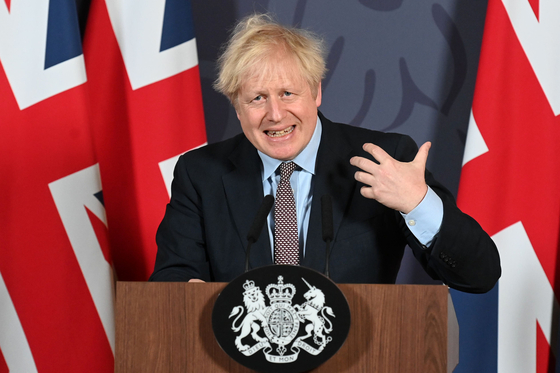![British Prime Minister Boris Johnson is holding a press conference at the residence of Prime Minister Downing Street in London on the 24th (local time). The UK and the European Union (EU) all agreed to negotiate future relations under Brexit. [AP=뉴시스]](https://i0.wp.com/pds.joins.com/news/component/joongang_sunday/202012/26/9723ab73-f9b9-4f41-927b-ffe8ffdf07b1.jpg?w=560&ssl=1)
British Prime Minister Boris Johnson is holding a press conference at the residence of Prime Minister Downing Street in London on the 24th (local time). The UK and the European Union (EU) all agreed to negotiate future relations under Brexit. [AP=뉴시스]
The UK and the European Union (EU) have finally agreed on the terms of Brexit (UK withdrawal from the EU). On the 24th (local time), a week before the breakup, negotiations on future relations, including trade terms, were completely concluded. It was four years after Britain decided on Brexit through a referendum in 2016, and 47 years after joining the European Economic Community (EEC) in 1973, it was a’consensual divorce’.
‘Brexit’ Dramatic conclusion of future relationship negotiations
Escape from the crisis of sharp rise in daily necessities and medicines
A nerve war until the last minute over the fishing rights
Domestic companies, EU local products, no tariff
Some machinery, etc. may not receive special benefits
British Prime Minister Boris Johnson said, “We have regained control over our law and our destiny. It is a good deal for the whole of Europe,” he said. “We will be friends and best markets in Europe.” “We have reached a fair and balanced agreement,” said Ursula Ponderrayen, the EU Commissioner. “It was a long and winding road, but a good agreement was reached at the end.”
The two sides agreed to a Free Trade Agreement (FTA) based on a tariff-free quota that does not impose taxes on imported and exported goods and does not impose restrictions on the volume of transactions. With this, it will be possible to prevent the so-called’no-deal’ Brexit from becoming a reality without consensus, and the soaring prices of necessities and medicines. The BBC broadcast said, “Last year, the volume of trade between the UK and the EU amounted to £680 billion (about 1003 trillion won). If we had not reached an agreement, the cost would have increased sharply.”
Free trade agreements cover not only trade but also investment, competition, state subsidies, energy and data protection. However, the agreement did not address specific details of the financial sector, foreign policy, foreign security, and defense cooperation. The sector that suffered pain until the end was the right to fishery. That’s why Prime Minister Johnson appeared wearing a fish-patterned tie at a press conference announcing the news of the deal.
The two sides agreed to reduce the quota for fishing vessels in EU member states operating within the UK’s Exclusive Economic Zone (EEZ) by 25% over the next five years and six months. Initially, the UK wanted to cut 80%, and the EU demanded equal treatment with British fishing boats, but they stepped back from each other in front of the crisis of catastrophe.
The country that confronted Britain until the last minute was France. This is because President Emmanuel Macron has maintained a strong attitude due to the traditional love-hate relationship and the livelihoods of fishing workers in northern France. The negotiation proposal takes effect upon approval by the British Parliament, EU member states and the European Parliament respectively.
In this regard, the Korea International Trade Association analyzed on the 25th that “the effect of this negotiation result on domestic companies that export directly to the UK or EU will be negligible.” First of all, as the Korea-English FTA was officially signed on August 22, last year, the preferential FTA trade relationship between the two countries continues. In addition, domestic companies that produce products in the EU and export them to the UK are also subject to duty-free benefits when clearing the EU and UK.
However, there are cases in which non-tariff preferential treatment is not available depending on whether the rules of origin are met. For example, for automobiles, related parts and machinery that apply the value-added standard, the larger the proportion of Korean-made parts used, the more the final product may not be recognized as domestically produced.
Certification regulations are different. The EU plans to no longer recognize the validity of the’CE certification’ that has been evaluated by a British accredited body after the implementation period is over. The UK has also announced its own’UKCA certification’ that replaces the CE certification.
Reporter Jeong Eun-hye [email protected]
